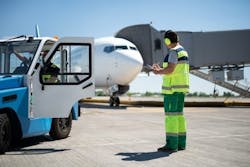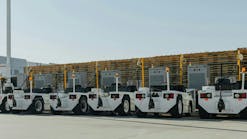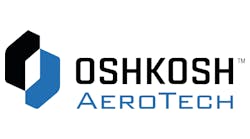UL Solutions Launches New Service to Evaluate the Safety of Lithium-ion Battery-Powered GSE
NORTHBROOK, Ill., Oct. 5, 2022 /PRNewswire/ -- UL Solutions, a global leader in applied safety science, today launched a new service evaluating lithium-ion battery-powered aviation ground support equipment to meet UL 5840:2022, the Standard for Electrical Systems of Battery Powered Aviation Ground Support Equipment.
UL 5840 provides clearly defined safety requirements that specifically address the risk of fire, electric shock and explosion hazards associated with the lithium-ion battery-powered airport ground support equipment (GSE). The Standard enables customers to accelerate the adoption of battery-powered ground support equipment to meet the requirements of carbon emission reduction programs mandated by respective local authorities and qualify for subsidies to invest in additional environmentally friendly operations.
In efforts to lower the environmental impact of airport operations, key stakeholders across the aviation industry supported the development of this Standard as they transform their existing ground support machinery into more energy-efficient electric vehicles. The Standard also addresses retrofitting lithium-ion batteries into more traditional diesel-powered equipment, as this is often a method used to upgrade existing fleets.
"UL Solutions is tackling a major challenge for the aviation industry by addressing safer installation, use and maintenance of lithium-ion batteries in aviation ground support equipment," said Maurice Johnson, product manager at UL Solutions. "Our new service is a key enabler for the aviation industry to speed the adoption of electric ground support equipment, which can significantly contribute to meeting carbon emission reduction goals."
A common thread among managers of dangerous goods and ground support teams in the aviation industry is agreement that prevention is the most effective method to help ensure safety. UL Solutions testing and certification to meet the UL 5840 Standard helps to mitigate potential issues related to the use, installation and maintenance of lithium-ion batteries in ground support equipment, ultimately supporting the adoption and electrification of such vehicles.





